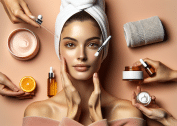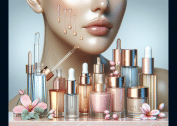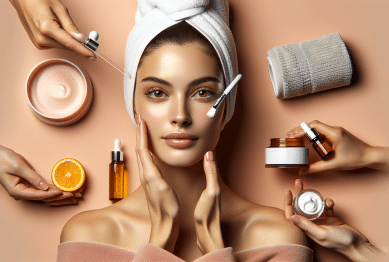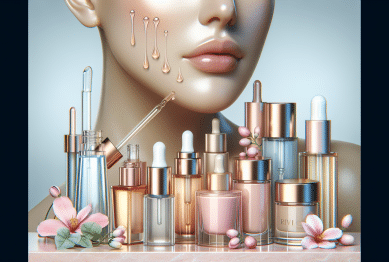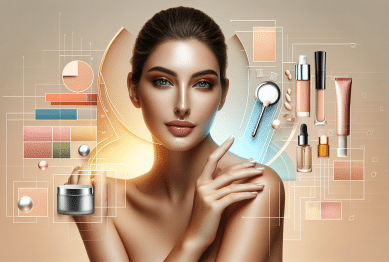Curious about why collagen is everywhere in the beauty world? Dive into the science, benefits, and realistic results of collagen for skin health. This handy guide reveals the real deal behind supplements, lifestyle choices, and expert-backed beauty routines for lasting glow and wellness.
Understanding Collagen and Why It Matters
Collagen is a vital protein that makes up a large part of the body’s connective tissue, supporting the structure of skin, hair, and nails. When discussing skincare, collagen often comes up as a buzzword. But what exactly is it? Simply put, this structural protein acts as the skin’s scaffolding, helping keep it supple, youthful, and elastic. As we age, natural collagen production slows, leading to visible changes such as fine lines, dullness, and a loss of firmness. Exploring collagen’s true function is the first step in understanding how to preserve a radiant complexion for longer.
There are multiple types of collagen in the body, but type I collagen dominates in the skin. Its role in maintaining plumpness is critical. Environmental stressors like UV exposure, pollution, and smoking can accelerate its breakdown, making protection and restoration essential. Internal and external factors influence collagen levels, meaning everyday choices can have a visible impact. Learning the basics empowers people to make decisions that support glowing, resilient skin at any age, even without dramatic interventions. Natural aging is inevitable, but some strategies may help slow obvious signs.
Collagen is not just about vanity. This protein supports wound healing, hydration, and the skin’s defense against outside threats. When the collagen matrix weakens, skin can become more prone to dryness and irritation. By prioritizing collagen maintenance, many people find benefits that extend beyond appearance, such as improved comfort and resilience against daily stress. For those chasing natural beauty and holistic wellness, collagen education is a starting point to uncover compelling possibilities for both short-term radiance and long-term skin vitality (https://www.ncbi.nlm.nih.gov/pmc/articles/PMC3583886/).
Popular Sources: Collagen Supplements, Foods, and Creams
Collagen can be found in an array of wellness products, including drinks, powders, capsules, serums, and topical lotions. Many wellness enthusiasts explore dietary supplements hoping for improved skin elasticity and reduced wrinkles. These products are often made from hydrolyzed collagen, which is broken down for better absorption. But the science on oral collagen is mixed. Some short-term studies show mild improvements in hydration and wrinkles, while others suggest benefits take months to appear. It’s not a miracle, and everyone’s results are unique due to genetic and lifestyle differences.
Beyond pills and powders, certain foods naturally support collagen production or provide the building blocks for synthesis. Bone broth, eggs, chicken, and fish are classic examples, as they are rich in amino acids like glycine and proline. Vitamin C–rich produce, such as oranges and kale, plays a key role in collagen formation as well. For those preferring a plant-based approach, focusing on nutrient synergy (not direct collagen) is important. Including a variety of nutrients in meals may be more powerful than solely relying on supplements.
Topical creams with peptides and antioxidants often feature promises about boosting collagen from the outside in. While creams can hydrate, most cannot deliver full collagen molecules deep into the dermis due to size limitations. Instead, these products may help protect or stimulate the skin’s surface for a healthier appearance, often by supporting moisture or reducing inflammation. There’s value in skincare routines—but setting realistic expectations is key. Learning to read ingredients helps make informed choices in an industry saturated with ambitious claims (https://www.hsph.harvard.edu/nutritionsource/collagen/).
Lifestyle Choices and Collagen Preservation
Daily habits can play a bigger role in collagen health than any product or magic bullet. UV exposure is a primary driver of collagen breakdown; regular use of broad-spectrum sunscreen prevents much of this damage. Smokers, on average, see a premature loss of collagen compared with non-smokers. Avoiding environmental toxins, managing stress, and maintaining hydration all work together to help skin thrive. It’s a holistic approach, where prevention outweighs quick fixes in the quest for a lasting youthful glow.
Sleep is another foundational pillar. During deep rest, the body repairs tissues, including the delicate collagen network in facial skin. Chronic sleep deprivation can disrupt this regenerative cycle, leading to dullness and rough texture. Exercise also brings benefits, as increased circulation delivers more oxygen and nutrients to the skin, indirectly supporting collagen synthesis. Even a simple daily walk can form part of a comprehensive wellness routine that loves the skin from within.
Nutrition can’t be overstated. Antioxidant-rich foods, healthy fats, lean proteins, and enough fluids create a strong foundation for skin repair. Experts suggest that dietary patterns high in sugar or heavily processed foods might encourage glycation, a process that damages collagen fibers over time. By choosing whole foods and minimizing excessive sugar, individuals support the body’s natural repair mechanisms. While creams and drinks are tempting, the foundation for glowing skin is built on what happens in the kitchen, gym, and daily living (https://www.aad.org/public/everyday-care/skin-care-secrets/anti-aging/skin-care-for-firm-skin).
Debunking Myths and Marketing Claims Around Collagen
It’s hard to scroll through social media or walk the beauty aisles without seeing collagen splashed on labels. But do all these products actually work? Many claims go beyond what current science supports. For instance, drinking collagen does not guarantee it will directly rebuild the skin’s structure; the body digests proteins into amino acids first. Topically applied collagen is too large to reach deep skin layers. It’s useful to approach beauty trends with both hope and skepticism.
In fact, no pill or cream is a substitute for daily skincare basics and balanced living. Stunning before-and-after photos in ads often reflect more than just one new ingredient—they usually involve lighting, temporary plumping, or other factors. Regulatory agencies warn that anyone promising miracle results probably isn’t painting the whole picture. This doesn’t mean collagen products have no value, but it urges a critical eye and an open mind when evaluating beauty news.
Transparency from brands is increasing as consumers become more knowledgeable. Brands now disclose their formulation details, sourcing, and clinical studies (when available) to foster trust. Following sources like professional dermatology associations can cut through the hype and focus attention on what matters. Being informed helps people spend wisely, banishing disappointment and empowering routines that nourish both confidence and skin health (https://www.fda.gov/consumers/consumer-updates/skin-care-products-what-know).
Expert Insights: What Dermatologists Recommend
Board-certified dermatologists often offer practical, evidence-based advice on incorporating collagen into a beauty or wellness plan. Most agree that the basics—sun protection, gentle cleansing, and daily moisturization—trump fancy creams or cocktails. They often recommend boosting dietary collagen through balanced nutrition instead of solely relying on supplements. Collaborating with skin experts ensures safe decisions, especially for those considering advanced treatments like microneedling or laser therapies.
Some practitioners recommend peptides and antioxidants alongside retinoids or vitamin C in topical routines to support the skin’s natural repair. For those without allergies or sensitivities, oral collagen may offer subtle improvements, especially in hydration, but patience is required. Individual results will always vary, and no treatment is universally effective. Medical consultations provide a reality check about product potential and possible risks.
Dermatologists often advocate patch-testing new products to prevent irritation, especially for sensitive skin types. They highlight regular skin checks and adopting habits that minimize inflammation and environmental stress. Trusted practitioners emphasize that real beauty goes beyond products: it’s about consistency, tailored advice, and self-care that aligns with personal wellness goals. Seeking guidance from certified experts leads to a more rewarding and sustainable skin journey (https://www.aad.org/public/diseases/a-z/skin-care-basics).
Realistic Expectations and Long-Term Benefits
People exploring collagen options often hope for rapid transformation, but gradual, subtle improvements are more typical. Consistency with daily habits, balanced routines, and protective measures produce the most reliable results. Celebrating minor yet meaningful shifts, such as smoother texture or a fresher complexion, helps foster a positive relationship with skincare. It’s a journey rather than a destination.
Prioritizing prevention, self-kindness, and realistic expectations delivers wider wellness perks. Many discover improved self-esteem, healthier routines, and confidence that radiates beyond the skin’s surface. Tracking progress with photos or journals provides motivation and encourages mindful adjustments. For some, the greatest benefit is building a foundation that supports aging gracefully, rather than fighting the natural process.
Embracing a holistic strategy for collagen and skin health nurtures both body and mind. There’s no single solution, but a personalized blend of habits, knowledge, and perseverance delivers the lasting glow many seek. By focusing energy on what works and letting go of myths, individuals can cultivate beauty that feels both empowered and authentic (https://www.ncbi.nlm.nih.gov/books/NBK21582/).
References
1. Proksch, E., Schunck, M., Zague, V., Segger, D., Degwert, J., Oesser, S. (2014). Oral intake of specific bioactive collagen peptides reduces skin wrinkles and increases dermal matrix synthesis. https://www.ncbi.nlm.nih.gov/pmc/articles/PMC3583886/
2. Harvard T.H. Chan School of Public Health. Collagen. https://www.hsph.harvard.edu/nutritionsource/collagen/
3. American Academy of Dermatology Association. Skin care for firmer skin. https://www.aad.org/public/everyday-care/skin-care-secrets/anti-aging/skin-care-for-firm-skin
4. U.S. Food & Drug Administration. Skin Care Products: What to Know. https://www.fda.gov/consumers/consumer-updates/skin-care-products-what-know
5. American Academy of Dermatology Association. Skin care basics. https://www.aad.org/public/diseases/a-z/skin-care-basics
6. Wierbicka, J., & Górnicka, M. (2018). Collagen structure and its disorders. https://www.ncbi.nlm.nih.gov/books/NBK21582/


